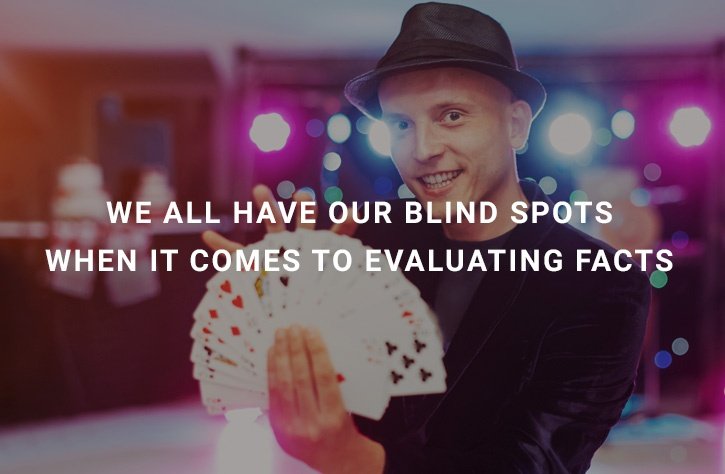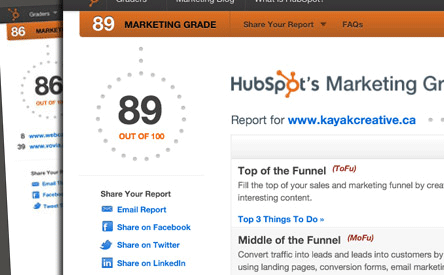Can Marketers Fool You Into Thinking You Haven’t Been Fooled?
Stop and think for a moment about how often you’ve seen something advertised on TV, or the Internet, and thought to yourself: “who would be stupid enough to buy that?”
The implication, of course, is that other people could be tricked or swayed by transparently flimsy logic, but that you yourself are too savvy to fall for such simple-minded tricks.
Most of us believe, on some level or another, that the public at large is just a little bit more gullible than we are. We just know, deep down inside, that we can’t be influenced like other people can. Or can we?
View all of the posts in our Cognitive Biases in marketing series.
We tend to hear we want to hear, and believe what we want to believe. The fact that we think we can’t be influenced as easily as others even has a name and psychology: third person effect.
The interesting thing about third-person effect is that it overlaps with other biases, and affects us on such a subconscious level that it’s difficult to detect. In some ways, it coincides with egocentric bias, in that we tend to think more of our own opinions and abilities than those we assign to others.
It also has an aspect of social desirability bias (which we’ll dive into in a future post), in that we all want to be seen as being worldly and wise. So, how does third person effect alter your thinking on a day-to-day basis? And what does it mean for your performance as a marketer?
Let’s go a little bit deeper into the details…
Third Person Effect Highlights Negative Associations
As noted above, the big result that comes from third-person effect is the idea that you are smarter than the average bear. That means the underlying psychological phenomenon is less pervasive – or even reversed – depending on whether a situation causes you to see yourself positively or negatively.
Let’s look at a straightforward example to see how this could work.
Suppose for a moment you were to see an advertisement for a cigarette, or some other unhealthy product. Perhaps the ad shows a bunch of glamorous-looking people having a great time at a party.
Assuming you don’t already have a nicotine habit, you are much more likely to report that such an advertisement might influence other people to take up smoking, drinking, or some other ill-advised behaviour than to consider the notion that it might influence you to do the same. You are probably going to feel like you couldn’t be manipulated in such a transparent way.
However, let’s reverse things and imagine another advertisement.
Instead of being for something unhealthy and socially unacceptable, suppose this ad is for a charity that encourages you to share your wealth during the holiday season.
It might feature celebrities or prominent individuals giving donations to less fortunate individuals and inviting the viewer to follow their example.
In such a situation, third person effect works in the opposite direction. That is, you are very likely to report that you would be swayed into generosity by what you’ve seen. The real difference isn’t in the persuasiveness of the messaging, though, but the perceived desirability of the intended action.
When the influence is a bad one, you feel like you’re impervious; when you want to feel good about yourself, you are more easily persuaded.
Obviously, third person effect ties in with selective memory and the themes of inflated self-worth that generally accompany all unconscious biases. Even so, it’s fascinating to discover how easy it is for us to lie to ourselves about our level of suggestibility.
Advertisers and Salespeople Love Third Person Effect
It probably won’t surprise you to know that advertisers and salespeople absolutely love third person effect. That’s because they know they can flatter you into making decisions you otherwise wouldn’t, and that your unconscious thought processes will stop you from realizing it’s actually happening.
How many sales calls, emails, or direct mail pieces have you gotten that contained language like “for the discerning investor,” or “others aren’t ready for this offer, but we are reaching out to you because you know better”?

As it turns out, we are usually kidding ourselves. While it’s true that some of us are more discerning or skeptical than others, we all have our own blind spots when it comes to evaluating facts or ideas.
The people in charge of generating revenue for the biggest brands know that they can feed upon your ego and come out ahead. Likewise, they can make you more susceptible to their offer by suggesting you aren’t as vulnerable to the tricks as other consumers might be.
These techniques are as insidious as they are effective. But, you can stop yourself from being manipulated simply by being on guard against third person effect and its many iterations.
 Teodora Petkova
Teodora PetkovaCopywriter, Semantic Web
Reminds me of what the author of Bursts said somewhere in the beginning of the book: That the Web is a giant laboratory for research. 🙂
How do You Overcome Third Person Effect?
As with all forms of bias, the best way to combat third person effect is simply to be aware of it. By knowing you have a subconscious tendency, you are more likely to recognize yourself falling for it. And, you become better able to spot attempts to move your thinking in a certain direction.
Another way to beat this particular bias is to listen to a wide range of opinions. If the decision you’re considering rests on the assumption that you know better than everyone else, then allow yourself to be a little suspicious and skeptical.
Study the numbers associated with any proposal, and ask yourself whether you might be falling for hype or flattery.
There certainly are areas of your life where you are more informed than the general public. However, as we learned from third person effect, those zones of knowledge, wisdom, and understanding aren’t quite as wide as we might imagine.
It’s easy to fool yourself into thinking you can be fooled at all, but that’s not the way life works. Don’t let your inner thoughts and sense of false confidence convince you otherwise.
Learn how we apply behavioural insights into lead conversion optimization using HubSpot Software.







